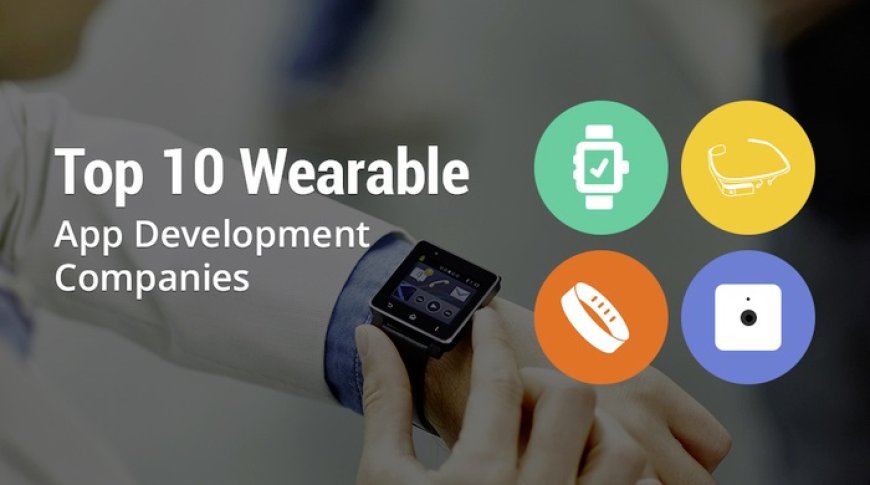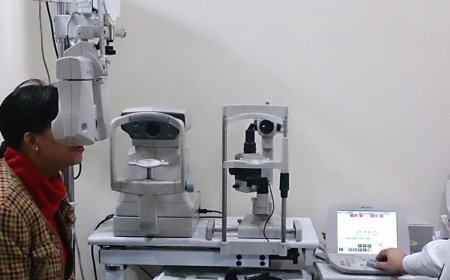What to Look for in an Australian Wearable App Development Company
Discover key factors to consider when choosing an Australian wearable app development company for your next innovative project.

Wearable technology has been advancing rapidly, transforming the way we interact with devices, track health, and even manage daily tasks. Whether it's smartwatches, fitness trackers, or augmented reality glasses, wearable technology has grown in both popularity and functionality. As businesses increasingly tap into this market, there's a growing demand for innovative, reliable wearable apps that can enhance user experiences.
Australia, known for its booming tech industry, has become a hub for wearable app development company. With many companies offering their services, it can be challenging to choose the right one. If you are a business or entrepreneur looking to develop a wearable app, understanding what to look for in an Australian wearable app development company is crucial for ensuring success. This guide will outline the key factors you should consider before making your decision.
1. Experience and Expertise in Wearable App Development
First and foremost, the development company's experience in wearable technology is crucial. While many companies can develop mobile apps, wearable apps require a different set of skills, frameworks, and tools. Look for companies that have:
-
Previous Experience in Wearable Projects: Check if the company has developed apps specifically for wearables like smartwatches (Apple Watch, Samsung Galaxy Watch), fitness trackers, or AR/VR glasses. A portfolio of completed wearable app projects is an excellent indicator that the company is familiar with the unique requirements of these devices.
-
Knowledge of Wearable-Specific Platforms: Wearable apps are often built on specific platforms such as Google Wear OS, Apple watchOS, and Samsung Tizen. Ensure that the company has expertise in developing apps for the wearable platform you are targeting. They should be able to handle the constraints of smaller screens, battery limitations, and hardware integration effectively.
-
Proven Track Record in Emerging Technologies: Since wearable apps often involve health tracking, fitness, or real-time monitoring, the company should have expertise in relevant technologies like IoT (Internet of Things), sensor integration, and data analytics. Familiarity with these will ensure that the app can fully utilize the capabilities of the wearable device.
2. Understanding of User-Centered Design (UCD)
A wearable app’s success hinges on its usability. Wearables, by nature, have limited display sizes and unique interaction mechanisms (gestures, voice commands, etc.). The company you choose should prioritize User-Centered Design (UCD) principles to ensure that the app provides a seamless and intuitive experience for users.
-
Focus on Simplicity and Accessibility: Wearable apps must be straightforward and easy to navigate. The development company should understand how to design minimalistic, yet functional, user interfaces that allow users to access the most important features without clutter.
-
Prioritize User Experience (UX) Testing: Before the app goes live, extensive usability testing on actual wearable devices should be conducted. The company should have a process in place to gather user feedback and iterate on designs based on real-world usage.
-
Innovative Use of Interaction Patterns: A good development company will be able to take advantage of wearable-specific interaction methods such as gestures, voice control, or even biometric input. These features can add value to the app and provide users with a unique experience.
3. Customization and Flexibility
Every business has unique requirements, and a good wearable app development company will tailor the app to meet your specific needs. Avoid companies that offer one-size-fits-all solutions.
-
Ability to Personalize the App for Your Needs: Whether you're creating a fitness app, a healthcare monitoring tool, or a fashion accessory, the company should be able to understand your specific objectives and customize the app accordingly. The ability to integrate branding, specialized features, and custom user interfaces should be a standard offering.
-
Scalability: Wearable technology is evolving quickly, and you want your app to keep pace with future developments. Ensure that the development company builds your app in a way that allows for updates and new feature additions as wearable technology grows and changes.
-
Cross-Platform Compatibility: While the focus may be on wearables, it’s often important for the app to be compatible with other devices like smartphones, tablets, and desktops. A good development company should be able to build apps that seamlessly integrate across various platforms, ensuring a cohesive experience.
4. Industry Expertise and Client Testimonials
Industry expertise matters. You want to choose a company that has experience not only in app development but also in your specific sector. Whether you’re in healthcare, fitness, fashion, or any other industry, the company should understand the nuances and challenges of that sector.
-
Portfolio and Case Studies: Check out the company's previous work. Do they have successful case studies? Have they worked with businesses in your industry? Portfolios provide a glimpse into their expertise and problem-solving skills.
-
Client Testimonials and Reviews: Positive feedback from previous clients can speak volumes about the company’s credibility, communication skills, and project management capabilities. Look for companies that have strong reviews and endorsements, as this indicates a history of successful collaborations.
-
Industry-Specific Knowledge: For example, if you are developing a health-related wearable app, the company should be well-versed in healthcare regulations, privacy standards (such as HIPAA), and integration with medical devices. This industry expertise ensures that the app complies with necessary regulations and delivers a high-quality experience.
5. Communication and Collaboration
Open and clear communication between you and the development company is crucial for the success of your project. From the initial consultation to post-launch support, the development company should involve you in every step of the process.
-
Transparent Development Process: The company should have a well-defined development process that includes regular updates, milestone tracking, and feedback loops. You should be able to monitor the progress of the app and provide input at various stages to ensure that the final product aligns with your expectations.
-
Dedicated Project Manager: Look for companies that offer a dedicated project manager who acts as your primary point of contact. This ensures that communication remains streamlined and efficient, reducing the chances of misunderstandings or miscommunications.
-
Flexibility in Approach: A good company should be flexible in its working methods. Whether you prefer Agile, Scrum, or another project management approach, the company should be willing to accommodate your preferred workflow to ensure smoother collaboration.
6. Security and Data Privacy
Data security is critical when developing apps, especially for wearable devices that may handle sensitive personal information such as health metrics, location, or payment details.
-
Strong Encryption Practices: Ensure that the development company adheres to industry-standard encryption practices to protect data transmitted between the wearable device and backend servers.
-
Data Privacy Compliance: If your wearable app deals with sensitive data, make sure the company complies with necessary privacy laws such as Australia’s Privacy Act, the European GDPR, or the U.S. HIPAA (for healthcare apps).
-
Security Testing: The company should perform rigorous security testing, including penetration testing, to identify and mitigate any vulnerabilities in the app before its launch.
7. Post-Launch Support and Maintenance
The launch of your app is just the beginning. Wearable technology, as well as the platforms they run on, are constantly updated, and your app will need regular maintenance and updates to keep up with these changes.
-
Ongoing Support Plans: Choose a company that offers comprehensive post-launch support. This includes bug fixes, updates, and the addition of new features as necessary.
-
Monitoring and Analytics: A good development company will provide tools for monitoring app performance, user engagement, and other key metrics. This data can inform future updates and improvements.
-
Regular Updates and Compatibility Testing: Wearable devices frequently release new hardware and software versions. Your app must stay compatible with these updates. Ensure that the company offers a maintenance plan that includes regular testing against new versions of wearable operating systems.
8. Cost and Budget Considerations
While cost is always an important factor, it shouldn’t be the sole determinant. However, you do need to ensure that the company’s pricing aligns with your budget while also reflecting the quality of the work you expect.
-
Clear and Detailed Pricing: Look for companies that offer transparent pricing structures with detailed cost breakdowns for each stage of development. Hidden costs can derail your project, so it’s essential to have a clear understanding of what you’re paying for upfront.
-
Balance Between Quality and Affordability: Keep in mind that while cheaper options may save you money initially, they could cost you more in the long run if the quality of the app is compromised. It's worth investing in a company that delivers high-quality work, even if it means stretching your budget slightly.
-
Flexible Payment Models: Some companies offer flexible payment options, such as milestone-based payments or monthly retainer models for post-launch support. This can make the project more manageable financially and ensure that you pay based on the delivery of results.
9. Technical Proficiency and Cutting-Edge Tools
The success of your wearable mobile app development company in australia is closely tied to the company’s technical skills. They must be proficient in a variety of programming languages and tools commonly used in wearable app development.
-
Proficiency in Native and Hybrid Development: Depending on your project, you may need a company that can develop either native apps (for a specific operating system) or hybrid apps (which work across multiple platforms). The company should be well-versed in both approaches and able to recommend the best solution for your needs.
-
Use of Cutting-Edge Tools: The company should use modern development frameworks and tools to ensure that your app is robust, scalable, and future-proof. Look for proficiency in tools like React Native, Flutter, or Xamarin for cross-platform apps, as well as Swift or Kotlin for native apps.
-
Ability to Integrate with Third-Party APIs: Wearable apps often need to integrate with external APIs, whether for health tracking, fitness data, or other services. Make sure the company has experience with integrating and working with third-party APIs.
What's Your Reaction?















![Noots Focus Reviews [Truth Exposed 2025]!](https://news.bangboxonline.com/uploads/images/202501/image_430x256_678e3b94881a1.jpg)
![Vivalis Male Enhancement: The Must-Know Ingredients [2025 Update]](https://news.bangboxonline.com/uploads/images/202501/image_430x256_678e3b54e396c.jpg)













